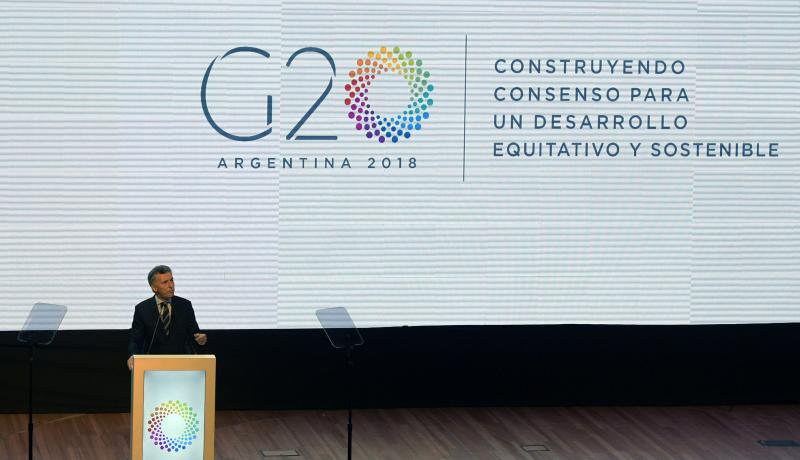
The G20 played a clear and decisive role in coordinating the international response to the financial crisis of 2008 and 2009. In particular, the establishment in 2009 of the Financial Stability Board, a body that monitors the global financial system, helped shape post-crisis regulation. Decisions taken at a G20 summit to significantly increase the resources of the IMF buttressed financial stability and helped reinforce confidence.
As immediate financial crisis has eased, however, efforts to engineer faster growth or address the problems of global imbalances have been less successful. Successive summits zig-zagged about what was the most appropriate fiscal response, with the group in 2009 agreeing a commitment to relaxation only to reverse course the following year. An Australian-led summit held in 2014 successfully raised the profile and importance of infrastructure spending but the results have been mixed.
Over the last couple of years, the G20 has fallen into greater disarray, as the broad pro-market and pro-trade consensus that has underpinned collaboration between the large economies has begun to fragment.
The decision by British voters to leave the European Union in June 2016 has weakened the biggest trading block within the G20. President Donald Trump's election a few months later has brought into question continued US support for global collaboration and free trade. The last ministerial meeting of the World Trade Organization in December ended in discord, with progress over further liberalization definitively stalled.
Geopolitical tensions between the US and China have been growing. Some of the emerging market members of the G20 – the so-called BRICS, whose economic performance seemed to offer much promises a decade ago – have been knocked by corruption scandals and recession.
All of which makes it a good time for Argentina and its president, Mauricio Macri, to be taking up the presidency of the G20. Having seen at first hand the dangers of defensive protectionism in Argentina, Macri may be able to provide a much need reinforcement of G20 support for free trade and multilateralism.
Following on from its own financial crisis in 2001, when in chaotic circumstances the country abandoned its convertibility peg to the dollar and defaulted on its debt, Argentina was for the best part of a decade and a half in the vanguard of Latin America's experiment with left-wing ‘populism’.
Led first by the Peronist Néstor Kirchner from 2003 to 2007, and then until 2015 by his wife Cristina Fernández de Kirchner, Argentina successfully renegotiated its debt burden and recovered strongly.
But the Kirchners took an increasingly controversial approach towards economic management and clashed frequently with local business and private investors. A raft of subsidies and protective tariffs created serious economic distortions, and contributed to high levels of inflation.
Argentina found itself largely shunned by international capital and cut off from financial markets. Indeed, although a member of the G20 – albeit with an economy smaller than all other members apart from South Africa – Argentina's market is so small that it is labelled a ‘frontier’ market – alongside minnows such as Mauritius and Bangladesh – in the widely used MSCI index of Morgan Stanley.
Macri's election in 2015 has marked a sharp change in direction. The successful businessman and former mayor of Buenos Aires won with a small majority. But he moved quickly to restore Argentina's access to international capital, reaching an agreement with investors who had refused to accept the terms of the earlier debt deal and then successfully raising finance on the bond markets.
The economy is being managed in a more consistent way. Many subsidies have been eliminated. Statistics have become more reliable and some of the wilder price distortions eliminated. At the same time, however, Macri has resisted pressure from right-wing critics to start reducing the fiscal deficit at a faster rate in order to protect social spending. Public works programmes have been introduced in order to generate jobs and improve transport, water and sewage provision in poor urban areas.
There is much to be done. The fiscal deficit remains worryingly high, with the primary deficit (before debt payments) still more than 4 per cent of GDP. Macri has barely begun the reforms needed to reshape the top-heavy public sector, for example. The economy remains highly dependent on capital inflows.
Even so, for the moment, his centrist, market friendly approach seems to be paying off. In October last year the pro-government alliance – Cambiemos, or Let's Change – scored an impressive victory, winning a majority of the congressional seats up for election. Peronism – the blend of nationalism and labourism that has dominated Argentine politics since the mid-1940s – has been seriously weakened, opening up the possibility of a second presidential term in 2019.
It is even possible to hope that, much as Emmanuel Macron's triumph last year in France reinvigorated the European political centre, Macri's success might provide a centrist and progressive model for Latin America. In a region where the appeal of extremist ideologies is still strong that would represent a welcome change, and would make Argentina an ideal example of leadership in the G20.
Richard Lapper, Associate Fellow, Global Economy and Finance Department and US and Americas Programme.
